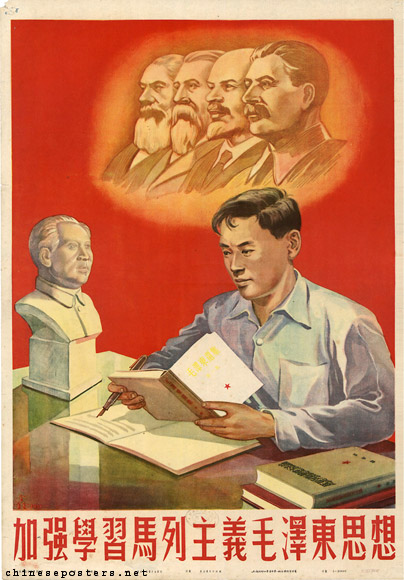More languages
More actions
(Removed quote, added CPC definitions of MZT) Tag: Visual edit |
(Added reference and a "See Also" section) Tag: Visual edit |
||
| Line 9: | Line 9: | ||
== Definition and Status == | == Definition and Status == | ||
In 1981, at the Sixth Plenary Session of the Eleventh Central Committee of the Communist Party of China, the "Resolution Concerning Certain Historical Issues of the Party Since the Founding of the People's Republic of China" summarized the content of Mao Zedong Thought, and believed that Mao Zedong Thought enriched and developed Marxism with original theories in six aspects. The living soul of Mao Zedong Thought, contains standpoints, viewpoints, and methods that are represented with the six components and the three basic aspects. | In 1981, at the Sixth Plenary Session of the Eleventh Central Committee of the Communist Party of China, the "Resolution Concerning Certain Historical Issues of the Party Since the Founding of the People's Republic of China" summarized the content of Mao Zedong Thought, and believed that Mao Zedong Thought enriched and developed Marxism with original theories in six aspects. The living soul of Mao Zedong Thought, contains standpoints, viewpoints, and methods that are represented with the six components and the three basic aspects.<ref>The Central Committee of the Communist Party of China . [http://news.xinhuanet.com/ziliao/2002-03/04/content_2543544.htm Resolutions on Several Historical Issues of the Party Since the Founding of the People's Republic of China] - Xinhua.net</ref> | ||
The six components: | The six components: | ||
| Line 28: | Line 28: | ||
<blockquote></blockquote> | <blockquote></blockquote> | ||
== See Also == | |||
* [[Marxism-Leninism-Maoism]] | * [[Marxism-Leninism-Maoism]] | ||
* [[Deng Xiaoping Theory]] | * [[Deng Xiaoping Theory]] | ||
Revision as of 16:08, 19 March 2023
 | This article is a stub. You can help improve this article by editing it. |
- Not to be confused with Maoism.

Mao Zedong Thought[a] (Simplified Chinese: 毛泽东思想; Traditional Chinese:毛澤東思想; Pinyin: Máo Zédōng sīxiǎng) is a development of Marxism-Leninism adapted for the material conditions of China. MZT was originally developed by Mao Zedong. Mao Zedong thought is ultimately the Sinicization of Marxism. The belief that the Party should adapt the basic principles of Marxism to China's reality. Marxism is the system of socialism with a scientific world outlook. It is a practical and open philosophy, and has been Sinicized and meticulously put into practice in China.
That the CPC's understanding of the real conditions must be based on China's specific circumstances, and it should always seek truth from facts. Only in this way can the basic principles of Marxism be applied to solve the problems and address the contradictions within Chinese society. The basic principles of Marxism and China's fine traditional culture should be integrated. Fine traditional culture corresponds to the inherent values that Marxism advocates, and is fertile ground for the Sinicization of Marxism.
Mao Zedong Thought is a fine example of integrating Marxist principles with Chinese culture. For example, the term "seeking truth from facts" first appeared in the ancient book History of Han Dynasty, but Mao gave it an ideological meaning by using it in his Marxist theoretical discourse. Similarly, Xiaokang (moderately prosperous) first appeared in The Book of Songs, but Deng endowed it with the meaning of Chinese-type modernization, and thus made it a pivotal term in the development of socialism with Chinese characteristics in the era of reform and opening-up.
Definition and Status
In 1981, at the Sixth Plenary Session of the Eleventh Central Committee of the Communist Party of China, the "Resolution Concerning Certain Historical Issues of the Party Since the Founding of the People's Republic of China" summarized the content of Mao Zedong Thought, and believed that Mao Zedong Thought enriched and developed Marxism with original theories in six aspects. The living soul of Mao Zedong Thought, contains standpoints, viewpoints, and methods that are represented with the six components and the three basic aspects.[1]
The six components:
- On the New Democratic Revolution.
- On socialist revolution and socialist construction.
- On the construction of revolutionary armies and military strategy.
- On policy and strategy.
- On ideological work, political work and cultural work.
- On party building.
The three basic aspects:
- Seek truth from facts: To link theory with practice, emancipate the mind, and test the truth with objective praxis.
- The mass line: That is, everything is for the masses, everything depends on the masses, comes from the masses, and goes to the masses
- Independence: That is to put the policy on the basis of the reality of the country and the power of the people of the country, and find out the way forward that suits the material conditions of the country.
See Also
References
- ↑ The Central Committee of the Communist Party of China . Resolutions on Several Historical Issues of the Party Since the Founding of the People's Republic of China - Xinhua.net
Notes
- ↑ Chinese: 毛泽东思想
